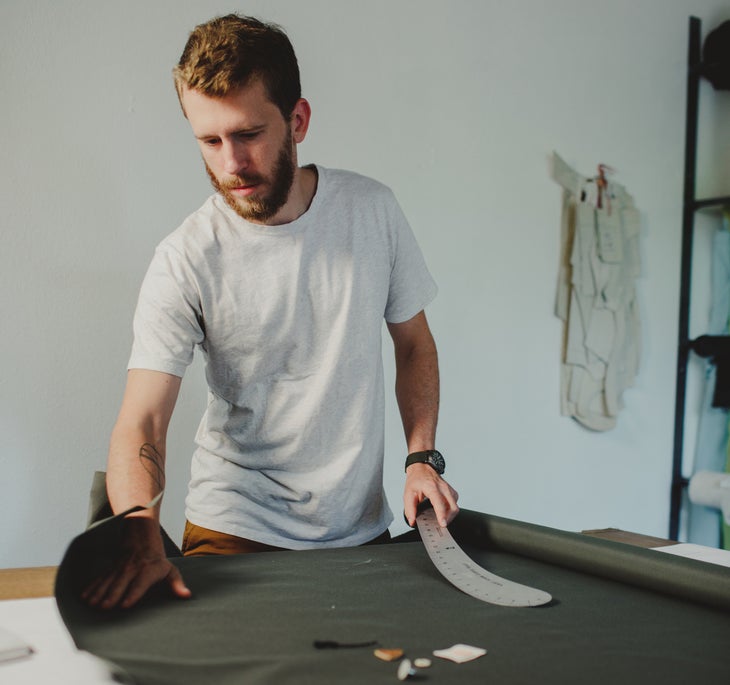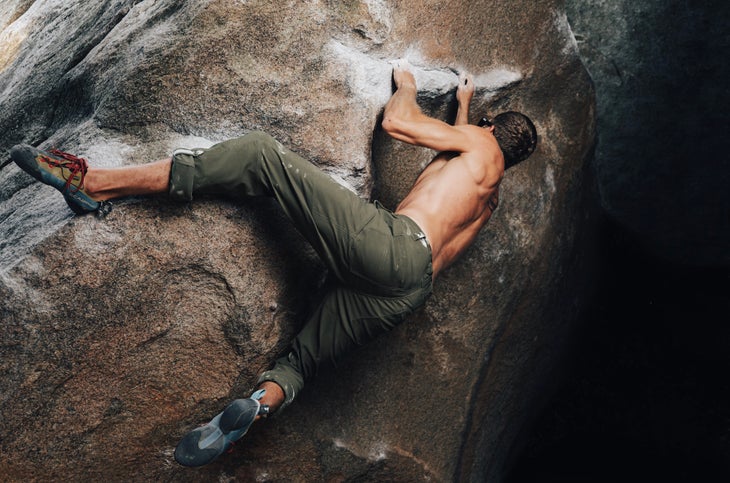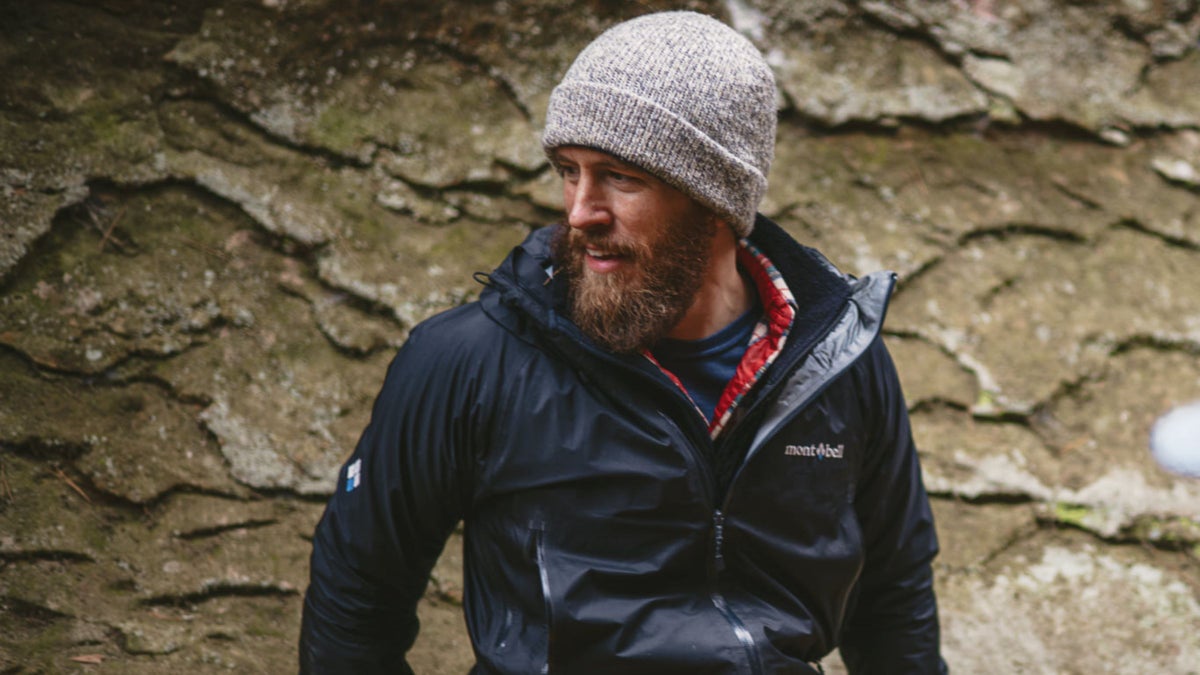No products in the cart.
Outdoor Adventure
Running an Outdoor Startup with a Criminal Record
Last week, Livsn founder and CEO Andrew Gibbs-Dabney posted to LinkedIn. It wasn’t about quarterly sales or supply-chain struggles.
It was about robbing a liquor store.
In his post, Gibbs-Dabney told a deeply personal story: about his oxycontin addiction in college and, in 2011, his decision to hold up an Arkansas liquor shop in a drug-induced haze.
“There was no violence,” he wrote. “There were no threats. I think I even said please and sorry. I was in there for over 15 minutes, presumably working up the courage to do the act. You see, I don’t really remember doing it.”
Facing 40 years to life, he entered rehab and was given a second chance, serving about six months in correctional facilities in Arkansas. After getting his addiction under control through treatment, Gibbs-Dabney returned to college to study organizational management. He landed a job at the apparel brand Fayettechill, where he learned the ins and outs of the outdoor industry. It was the break he needed.

In 2018, Gibbs-Dabney launched his own apparel brand, the Bentonville-based Livsn, whose name is derived from the Swedish word livsnjutare, meaning “one who lives life fully.”
“I knew I wanted to be in the outdoor industry,” he said. “I want to spend my time outside, and I want to spend my time around people who want to be outside.”
Today, Gibbs-Dabney runs Livsn—which specializes in adventure pants—alongside five full-time staffers. The brand’s products can be found at Packrat Outdoor Centers in Arkansas and online at Backcountry.com, Moosejaw.com, and the Livsn website. The current lineup includes seven styles of men’s and women’s pants, shorts, and overalls, and Gibbs-Dabney said Livsn plans to release more women’s clothing and tops next year.

Successful crowdfunding campaigns have helped Livsn grow (there’s one ongoing now that has raised more than $400,000 for business expansion), but despite the company’s proven track record, it was Gibbs-Dabney’s criminal record that tanked a deal with a high-profile investor and prompted him to post his story on LinkedIn.
We chatted with Gibbs-Dabney this week to ask about the reaction to his post and the challenges of running an outdoor business with a criminal record. The below conversation has been edited for clarity.
Your LinkedIn post has been getting a lot of attention. What prompted you to share something so personal—especially on a business platform?
You mean why now, after 11 years? I guess the catalyst was being passed up for an investment opportunity.
There was a TV host from a well-known show and we were supposed to do an interview. We came close to shooting before I learned that [my spot] had been canceled. I pushed a little bit and said, ‘Hey, if it’s a scheduling conflict or something, I’m here to work with you. Let’s make this happen. I’m super excited.’ They said, ‘No, it’s actually that your criminal background check came back and we can no longer move forward.’ It felt like a punch in the gut.
That was the first time something like that had been explicitly stated, but I have a suspicion that’s happened more than once with other opportunities.
What kind of response have you gotten to the post so far?
I didn’t have high aspirations for it—it was just something I wanted to get off my chest. But since then, I’ve realized it’s been very helpful to people with backgrounds of alcoholism, drug addiction, and conviction who are now doing great things with their lives.
Since the post, lots of people with that history have admitted to me that they don’t talk about those things, but they want to. There are a lot of people who have something in their past that they’re not proud—but that has shaped them into who they are. Most of them just want to have it out there without being ashamed. The post seems to have encouraged people to share their struggles and what they’ve overcome. It’s been really cool to see.
Were you afraid of any negative repercussions?
I was very nervous when I wrote it. I spent several days on it and didn’t click “publish” for a whole week. I was afraid of losing investors, but I thought it was more important to get this out there. Instead of investors dropping me, they’ve only shown support, and some have even increased their investment. Now that it’s public and I’ve seen the positive effect it’s had, I want to share it further. This is the first time I’ve spoken to the press about it. It was worth the risk to start this discussion.
How do you usually tell people about your record when you’re chasing new business relationships?
I tell people about my background, but it’s not something I lead with. Like I wrote in my post, it’s a third-date conversation. It doesn’t define me or the company, but it’s something I want people to know if we’re starting to get serious. It’s important for me to be transparent with people I’m going to be in a business relationship with, but it’s difficult to know when to bring something like that up. I want people to focus on Livsn and what we’re doing, but I don’t want to look like I’m hiding my past.
What’s been the hardest part of starting a business with a criminal record?
Having to explain your past when other startups don’t. As a founder, you want the story to be about your business—how incredible it can be—not about your past.
I had to petition to get my first apartment upon release from prison, to be readmitted to university, to transfer universities, and to get loans. I was successful in those appeals, but it’s a challenge most entrepreneurs don’t have to face and can certainly make a hard task even harder, maybe even impossible for some.
That said, I actually think there were fewer barriers in starting my own business than there would have been on a corporate-job track. I’m also very fortunate. I have family and friends who believed in me and made the initial investments. Not everyone has that type of privileged opportunity.
Finally, I was able to show our products and explain our company’s philosophy directly to the public on Kickstarter—something that wasn’t available in the past. I was able to get my products and ideas out there and not hit the roadblock of my criminal record right off the bat. Angel investors and Kickstarter backers are understanding, but background checks are not. When raising capital from institutional offices, your past will come up on a background search during due diligence. I know for a fact it caused me a missed opportunity once, and I suspect it has happened on other occasions.
Were there any surprise advantages, as a founder, of having gone through what you went through?
The biggest advantage is perspective and experience overcoming challenging situations. When you’ve seen how bad life can be, it’s easier to deal with the never-ending challenges of starting your own business. A bad day working on your startup is nothing compared to a bad day in a prison cell.
A lot of convicted people have great business sense and experience. How they gained it might not have been exactly legal, but the basic mechanics of demand, procurement, margin structure, supply chain, and sales are the same if you’re selling something legal or illegal. I think there’s untapped potential among the convicted population; many could be excellent businesspeople if given the chance they deserve.
A bad day working on your startup is nothing compared to a bad day in a prison cell.
“Founder culture” is such a thing. Do you think it demands an unrealistic level of personal perfection among business owners?
The pressure of founder culture is real, especially when you choose, like I did, to build a company based on personal passions and values. On one hand, it makes things easier because the more authentic I am, the more it reflects the brand. But on the other hand, a brand is aspirational by definition and I don’t always live up to those aspirations. The truth is that I’m not perfect and never will be. I think founder culture is coming around to this reality and is starting to embrace vulnerability and realness alongside strong leadership.
Any advice for others with a similar history interested in starting their own business?
My advice would be to work on something you’re passionate about. It will take more of your time and energy than you think, and the difference between success and failure is often just sticking with it. If you can overcome addiction and conviction, you can do anything.
The truth is that I’m not perfect and never will be. I think founder culture is coming around to this reality.
Listening to what you’ve accomplished, you must be proud of how far you’ve come.
I am proud of it. It’s been a hard journey, but I’m proud of where I am now. When I tell the story to people I know, it’s never a negative thing. It ends up with a sense of understanding and respect. Being able to have that, in a public sense, and see the outpouring of support is very cathartic and has encouraged me to share the story more.
Source link

